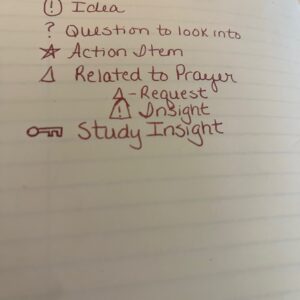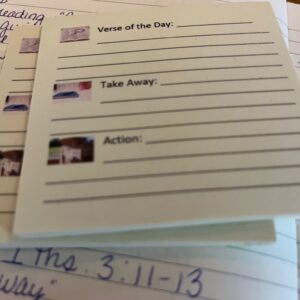A Powerful Tool for Catholic Homeschoolers
Organize Your Thoughts and Faith Life: The Art of Commonplace Books for Homeschoolers
Have you ever heard of a Commonplace Book? It is a method for collecting and organizing various pieces of information—such as quotes, stories, reflections, and insights—from sources like books, conversations, movies, music, social media, podcasts, or personal experiences you want to revisit. If you’re familiar with bullet journaling, commonplace books are similar.
This is a wonderful creative tool for planning and reflection that has been around for a very long time. It is as useful to us today as it has been throughout history. For homeschooling parents in particular, this can be a great way to bring the many things you are juggling in your mind in a calm and organized way. Let’s jump right in!
What are Commonplace Books?
Many definitions abound, but they boil down to some common denominators:
- Collections of insights from yourself and other sources that you find meaningful, helpful, or want to remember/review.
- Record or database of things that are important to you.
- A way to present and share. To store and organize.
The name “Commonplace Book” comes from the Latin “Loci Communes,” which translates to “commonplaces.” It is a common place for your valued insights and thoughts to grow and thrive together.
History of Commonplace Books
These thoughtful books can be traced all the way back to ancient Greece and Rome. They also had quite a resurgence in the Medieval and Renaissance eras, when they were heavily used in intellectual pursuits, such as by scholars and students. Commonplace books have always had a creative side as well. However, they also have a spiritual side. In a specifically Catholic context, they were used by clerics to collect passages of Scripture to reflect on.
Many famous names throughout history have kept Commonplace Books, such as:
- Seneca
- Cicero
- Marcus Aurelius (whose book became the Stoic philosophy book Meditations)
- Virginia Wolfe
- Thomas Jefferson
- Ronald Reagan
- Leonardo DaVinci
- Ralph Waldo Emmerson
- Saint Elizabeth Ann Seton
Why Keep a Commonplace Book
So many things cross our paths in this digital age, and often, as quickly as we are given pause by an event, insight, or moment, it is covered up by something else. One way we try to combat this is by keeping a plethora of journals or notebooks for different topics. Unfortunately, this can become too cumbersome. A commonplace book allows one notebook to serve a broad purpose – organizing and nurturing your mind and creative processes and preserving the things we most want to remember.
The Commonplace Book and Faith
You can use a commonplace book to build your faith in many ways. If you’d like assistance with your faith life, the following are just a few suggestions:
- Insights from prayer, Scripture study, or spiritual reading
- Action plans for building virtue/habits
- Tracking Confession
- Prayers you love
- Prayer Requests
- Praying the Daily Examen
- Gratitude
- God-Moments
All of these are just suggestions. The spiritual component of a Commonplace Book will be as different as each individual person. That is one of the joys of this fabulous tool – you can tweak it to be precisely what you want it to be!
The Commonplace Book and Homeschooling
We put so much into ensuring we homeschool our kids to the best of our ability. Things are kept engaging, and the experience allows them to thrive. If you are like me, you often run across great ideas that you are determined to remember and implement but then forget about them in the busyness of everyday life. Enter: The Commonplace Book. Here are just a few things you might jot down in your own Commonplace Book to reflect on or implement later:
- Lesson ideas
- Insights from lessons you are teaching
- Goals
- Things that worked well and things that did not
- Lesson notes
- Website, resources, etc.
You can also use your commonplace book to expand on the notes you take when you have more time, make plans, keep recipes, work tasks/ideas, or whatever you like. The categories will be individual to you, and you are their common thread. Everything in your book relates to you somehow and lives in your mind for however long you like. The book is a tool that helps you organize and connect your thoughts from the various facets of your life.
So, how do we keep such a wide range of topics and thoughts organized in one book? Let’s work through that next!
Practical Implementation
We’ll start with the various tools you can use. A quick note: You can absolutely use different apps (such as Goodnotes or Evernote) and make one of your commonplace books digital. There are many ways to do this, but we will focus on the traditional notebook method in this article.
For this method, you only need a notebook and a pen or pencil to start. If you’d like a Catholic-themed notebook, you find them at Blessed is She or Catholic Company. Beyond that, your creativity can take you in many different directions! We will discuss that a bit later.
The first thing to do in your notebook is set aside anywhere from 5 to 10 pages as the “Index.” If you are familiar with bullet journaling, it works much the same way. Your index is the key to organizing your books and thoughts. Some notebooks have built-in pages for this, but you can easily do it yourself. Here is a photo of mine, when I started my current notebook. You can see that I have listed topics and then go back and write the page numbers when I add things to the book that fall under those topics.

Having what is known as a “key” in your book is also helpful. This is not required but helpful in the margins to quickly see what an entry relates to. Here is what mine looks like:

Beyond this, there are many materials you can use to personalize your book. Washi tape on the edges of pages can add a colorful way to mark different sections. Sticky tabs, bookmarks, or book darts are also great for organization. Incorporating sticky notes is another effective tool. Personally, I use sticky notes to keep my morning prayer resolution visible throughout the day. Whenever I open my commonplace book, I see the note and move it along as I turn the pages.

Wrap-Up
Every Commonplace Book will be as different as the various authors because it is a snapshot of your unique and one-of-a-kind mind and soul. Therefore, I encourage you to try this practice and make it your own! It keeps everything in one spot. Moreover, it’s a powerful exercise when you take time to go back and review your writing. These precious books can also be a wonderful keepsake for future generations one day. I hope this practice is as much of a gift to you as it has been to me!
What are your thoughts or questions on this topic? You can join me and other homeschooling parents at our Homeschool Connections Community or our Facebook group to continue the discussion!
Do not be conformed to this world, but be transformed by the renewal of your mind, that by testing you may discern what is the will of God, what is good and acceptable and perfect. -Romans 12:2
NOTE: This article contains affiliate links






